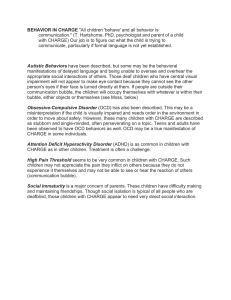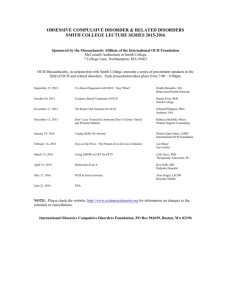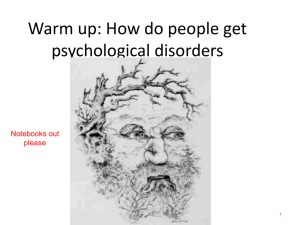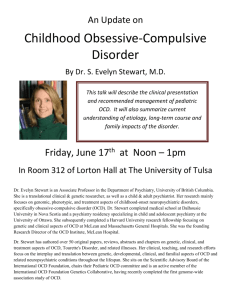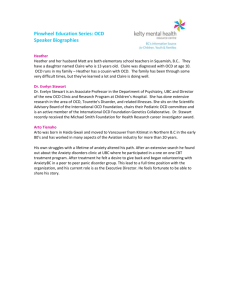Everything To Know About Obsessive Compulsive Disorder (OCD)
advertisement
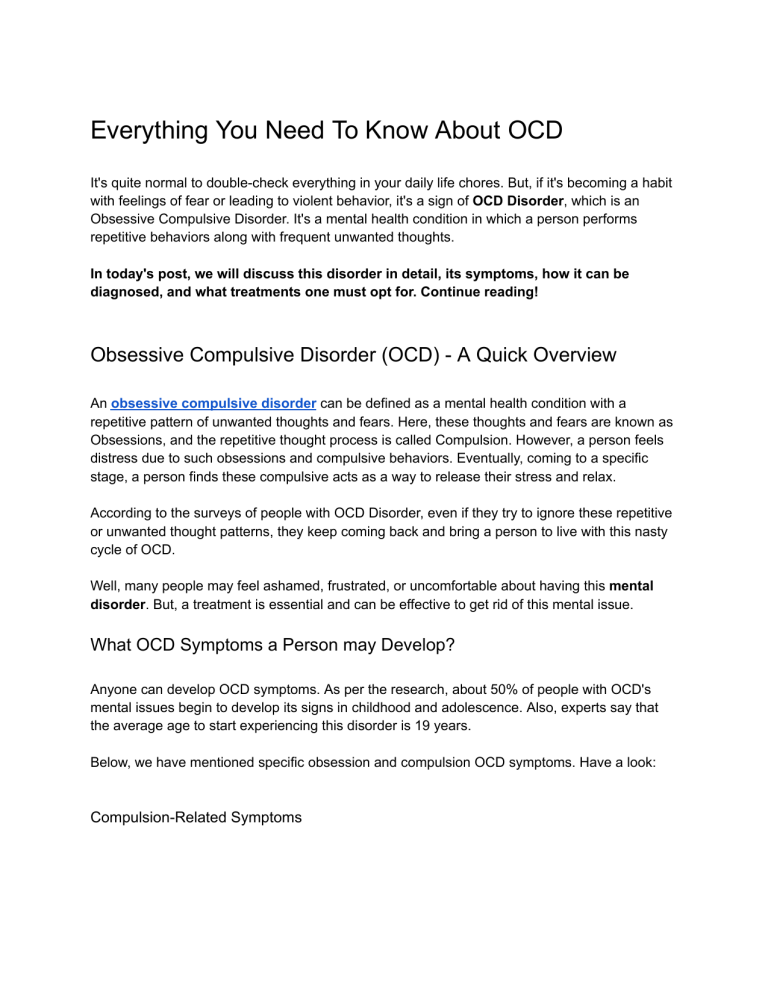
Everything You Need To Know About OCD It's quite normal to double-check everything in your daily life chores. But, if it's becoming a habit with feelings of fear or leading to violent behavior, it's a sign of OCD Disorder, which is an Obsessive Compulsive Disorder. It's a mental health condition in which a person performs repetitive behaviors along with frequent unwanted thoughts. In today's post, we will discuss this disorder in detail, its symptoms, how it can be diagnosed, and what treatments one must opt for. Continue reading! Obsessive Compulsive Disorder (OCD) - A Quick Overview An obsessive compulsive disorder can be defined as a mental health condition with a repetitive pattern of unwanted thoughts and fears. Here, these thoughts and fears are known as Obsessions, and the repetitive thought process is called Compulsion. However, a person feels distress due to such obsessions and compulsive behaviors. Eventually, coming to a specific stage, a person finds these compulsive acts as a way to release their stress and relax. According to the surveys of people with OCD Disorder, even if they try to ignore these repetitive or unwanted thought patterns, they keep coming back and bring a person to live with this nasty cycle of OCD. Well, many people may feel ashamed, frustrated, or uncomfortable about having this mental disorder. But, a treatment is essential and can be effective to get rid of this mental issue. What OCD Symptoms a Person may Develop? Anyone can develop OCD symptoms. As per the research, about 50% of people with OCD's mental issues begin to develop its signs in childhood and adolescence. Also, experts say that the average age to start experiencing this disorder is 19 years. Below, we have mentioned specific obsession and compulsion OCD symptoms. Have a look: Compulsion-Related Symptoms Compulsion, which is a mental repetitive act of behavior, gives one limited relief from anxious feelings. Additionally, a person follows the compulsion ritual for no reason but only to get relief from the stress. The symptoms include: ● ● ● ● ● ● ● Continuously washing hands till they are not chapped or sore Following a strict and timely routine with no compromise Frequent asking for approvals or reassurance Double-checking again and again Frequent cleaning of everything due to the fear of germs or contamination Silently repeating a word, phrase, or prayer Repetitive counting of a specific pattern Obsession-Related OCD Symptoms Obsession, the unwanted thoughts or feelings can be lasting. Even if one tries to ignore such feelings, they keep coming back, and the urges cause stress or anxious feelings. Also, when one tries to divert their mind or do other things, these obsessive thoughts or feelings disturb them. Have a look at the below OCD disorder symptoms: ● ● ● ● ● ● ● Fear of being contaminated by touching things touched by others Frequent thoughts of harming others or sometimes yourself Thoughts of losing control Doubts and thoughts of uncertainty Needing everything in a specific order or properly organized Unwanted aggressive thoughts Excessive concern or extremely particular about "wrongs and rights Major Causes of Developing Obsessive Compulsive Disorder There is no medical evidence related to the actual causes of obsessive compulsive disorder, and according to health experts, the causes are unknown. However, the following factors may put a person at risk of developing the signs of OCD: Genetics and Hereditary Causes Yes, genetic links and hereditary factors can also trigger a person with signs of OCD. If any of the family members already have OCD or related signs, the signs may affect other people of the same family through genes. However, medical experts are still researching this cause. Behavioral Factors Another risk factor is the change in behavior of a person due to a significant loss, traumatic event, or a moment of intense stress. Now, if a person gets connected to any object, situation, or feeling of fear at these moments, they are more likely to develop the signs of repetitive patterns, thoughts, and other signs of OCD disorder. Environmental Risk Factors A lot many people have reported the signs of OCD within the period of 6 months after experiencing the following situations: ● ● ● ● ● ● ● A traumatic brain injury or illness Complicated pregnancy phase Childbirth A severe illness or major accident A serious conflict Stress or depressive moods Infections in Children One of the main causes of obsessive compulsive disorder among children is infection from health issues like Lyme disease, group A streptococcal infections including scarlet fever and strep throat, or the H1N1 flu virus. Medical experts call this OCD sign pediatric acute-onset neuropsychiatric syndrome (PANS). In addition, the signs may disappear after 24-72 hours, but time later, they can come back and trigger the children. Neurological Conditions Many medical analyses and studies have shown that people with OCD symptoms have differences in the subcortical structures and frontal cortex in their brains. In other terms, a person is also likely to develop OCD due to the neurological conditions affecting similar areas of one's brain. These areas are Parkinson's disease, epilepsy, and Tourette's syndrome. Different OCD Types of Mental Health Disorders There is no proper classification of OCD types of mental health disorders, but according to varied signs, experts commonly separate the types as given below: Order and Symmetry Most people with OCD issues are extremely particular about order and symmetry. They experience obsession and compulsions associated with proper arrangements, organized everything, symmetric patterns, specific orders, and counting (evens or odds). Contamination Fear One of the most common OCD types of mental health disorders is the fear of contamination or germs. Often, people with signs of OCD fear germs or getting contaminated. Such people repeatedly clean surfaces, frequently wash their hands, avoid touching things touched by others, and hold excessive stress related to the food ingredients. Intrusive or Unwanted Thoughts Obsessive, unwanted, or intrusive thoughts about a particular theme, also known as Rumination, is another type of OCD. This type generally involves topics related to taboos, violence, religion, or sexuality. Double-Checking Yes, if you're wondering that double-checking is a type of mental health disorder, so it is. However, it becomes a type of OCD when a person excessively attempts double-checking out of compulsion. It may include repeated checking that electrical appliances are turned off or on, doors and windows are locked, or frequently ensuring nothing is lost or damaged. How to Diagnose Obsessive Compulsive Disorder? For diagnosing obsessive compulsive disorder, medical experts prefer specific criteria based on the person's developing signs. The diagnoses may include: ● ● ● OCD symptoms that are not oriented from the use of any drug, substance, or medication's side effects. Checking the presence of both compulsion or obsession signs in a person. OCD symptoms that can't be better confirmed by another health issue. What are the Possible OCD Treatments Since the causes are unknown, Doctors have proven the following OCD treatments that can be effective for a person developing OCD signs: Cognitive Behavioral Therapy (CBT) One of the most recommended psychotherapies is Cognitive Behavioral therapy (CBT). This therapy can help a person developing OCD issues by changing their way of thinking, feeling, and behaving. In this, the therapist encourages people with OCD not to be controlled by any obsession and to find out the actual cognitive distortions relating to the obsession. Suggested Medications There is no proper medicine with the surety of treating OCD. But as one of the OCD treatments, Doctors recommend medications, including antidepressants. These are paroxetine (Paxil), fluoxetine (Prozac), escitalopram (Lexapro), sertraline (Zoloft), or fluvoxamine (Luvox). Anxiety-Management Practices A few anxiety-management practices, including slow breathing exercises, meditation, hyperventilation control, and relaxation training, can help a person overcome their developing signs of OCD. The regular performance of these practices can be one of the most helpful OCD treatments. Summary..! Obsessive Compulsive Disorder (OCD) is one of the challenging mental health disorders as it impacts a person’s way of living. We hope this post has helped you learn about the different OCD signs and how it can be diagnosed. It’s important to opt for the most suitable OCD disorder treatments to get back to the normal lifestyle. So, if you are looking for OCD therapy then reach out to a counsellor for assistance.
